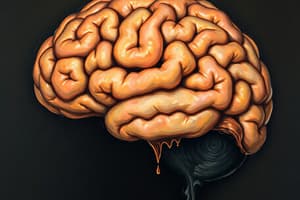Podcast
Questions and Answers
Which type of group is characterized by strong emotional connections?
Which type of group is characterized by strong emotional connections?
- Loose Associations
- Intimacy Groups (correct)
- Social Categories
- Task Groups
What is the primary focus of the Identification With All Humanity Scale (IWAH)?
What is the primary focus of the Identification With All Humanity Scale (IWAH)?
- To determine individual concern for humanity (correct)
- To measure group affiliations
- To evaluate emotional connections within groups
- To assess altruistic behaviors
Which of the following is an example of a Task Group?
Which of the following is an example of a Task Group?
- Friends meeting for coffee
- A family gathering
- A concert audience
- A work team (correct)
How do individuals with high scores on the IWAH typically behave?
How do individuals with high scores on the IWAH typically behave?
What distinguishes Loose Associations from other types of groups?
What distinguishes Loose Associations from other types of groups?
Which classification involves broad classifications like gender or ethnicity?
Which classification involves broad classifications like gender or ethnicity?
According to psychological theories, what characteristic do mature individuals possess?
According to psychological theories, what characteristic do mature individuals possess?
Which of the following is NOT a characteristic of a Task Group?
Which of the following is NOT a characteristic of a Task Group?
What role does the anterior cingulate cortex play in social rejection?
What role does the anterior cingulate cortex play in social rejection?
How does the activation of the anterior cingulate cortex relate to emotional distress?
How does the activation of the anterior cingulate cortex relate to emotional distress?
What evolutionary significance does the overlap between physical and social pain imply?
What evolutionary significance does the overlap between physical and social pain imply?
What are intimacy groups best characterized by?
What are intimacy groups best characterized by?
What type of group is primarily formed to achieve specific tasks or goals?
What type of group is primarily formed to achieve specific tasks or goals?
Which statement accurately reflects the interconnectedness of emotional and physical pain?
Which statement accurately reflects the interconnectedness of emotional and physical pain?
What impact might the pain system have on social interactions?
What impact might the pain system have on social interactions?
Which statement about the anterior cingulate cortex is correct?
Which statement about the anterior cingulate cortex is correct?
Flashcards are hidden until you start studying
Study Notes
Rejection and Brain (Anterior Cingulate, Pain System)
- Rejection triggers activation in the anterior cingulate cortex (ACC), which processes emotional distress.
- The ACC is integral to emotions, decision-making, and social interactions, becoming particularly active during social rejection.
- This brain region processes both physical and social pain, indicating a neural overlap in their circuitry.
- Evolutionarily, experiencing social pain alongside physical pain suggests adaptive functions related to social bonding and group dynamics for survival.
- The interconnection between emotional and physical pain suggests that social rejection can evoke pain responses similar to physical injuries.
- Such overlaps may reinforce social bonds and promote group cohesion, crucial for human survival.
- The pain system contributes to managing social interactions and enhancing emotional well-being.
Taxonomy of Groups (4 Types, Examples of Each)
- Groups can be categorized based on characteristics and functions, with four main types identified:
- Intimacy Groups: Close-knit groups that offer emotional support, e.g., family, friends, romantic partners.
- Task Groups: Formed to achieve specific objectives, e.g., work teams, juries.
- Social Categories: Broad classifications based on shared traits, e.g., gender (women), ethnicity (Blacks).
- Loose Associations: Informal groupings based on common interests or situations, e.g., classical music enthusiasts, people in line at a bank.
- Group memberships significantly contribute to self-identification, shaping an individual’s social identity.
Identification with All Humanity Scale (What Is It, Findings)
- The Identification With All Humanity Scale (IWAH) gauges how individuals identify with all humanity versus their own social groups.
- The IWAH concept is influenced by psychological theories from Alfred Adler and Abraham Maslow, emphasizing mature concern for humanity beyond narrow affiliations.
- The scale quantitatively assesses individual connections to humanity, revealing insights into empathy and social responsibility.
- Research by McFarland, Webb, and Brown (2012) demonstrates that higher IWAH scores correlate with increased altruistic behavior and a stronger sense of global citizenship.
- The scale serves as a valuable measurement tool for exploring the psychological foundations of empathy and promoting a sense of belonging that transcends local affiliations.
Studying That Suits You
Use AI to generate personalized quizzes and flashcards to suit your learning preferences.




